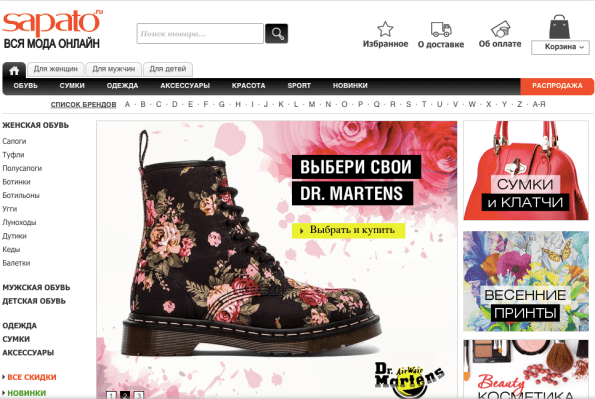Some downsizing underway for Ozon.ru, the e-commerce portal commonly referred to as the Amazon of Russia. The company is selling Sapato.ru — the “Zappos of Russia” that it acquired three years ago — to online fashion retailer KupiVIP.
Terms of the deal have not been disclosed by the companies, Ozon has confirmed to TechCrunch.
According to reports, they don’t sound great. Russian finance publication Vedomosti writes that the deal was likely for hundreds of thousands of dollars — basically for the domain and client list. When Ozon acquired Sapato.ru in February 2012, the terms were not disclosed but Vedomosti reports that the original acquisition was done for $60 million (to be clear, those numbers come from a competitor of Ozon’s in the story so it’s not at all certain that they are accurate).
The company says that Sapato had a client list of 6 million users and its website visited by more than 2.5 million people each month. But online orders are a considerably lower number: 500,000 in 2014.
The movement comes at an interesting time for tech businesses in Russia. Once a bright and big market full of engineering talent and a new middle class of consumers, more recently wider political changes have seen a retreat from the market by some western companies, and that has also had a knock-on effect in startup investments. Meanwhile, Skolkovo, the country’s big effort to build a “Silicon Valley” style tech ecosystem to Russia, yesterday announced that its latest investor would be Cybernaut, a Chinese firm that is committing $200 million to Skolkovo startups. Previous backers have included Cisco, Intel and Microsoft.
While a lot of that points to how international interests may be shifting right now, the sale of Sapato.ru points to some of the challenges facing squarely-domestic players in the country’s e-commerce market.
In a statement that was shared with TechCrunch, KupiVIP says that it is buying Sapato.ru to continue growing its business, leveraging the economies of scale of both its logistics platform and its buying power. It says it will continue to operate Sapato as an independent brand online, “while using the existing infrastructure of KupiVIP for purchasing, processing and delivering of products.” That will include delivery service, call center and logistics center. KupiVIP’s platform already manages 15 online shops in the country.
“We are certain that the purchase of Sapato.ru will allow us to reach a new stage of our business evolution. The KupiVIP business operations are currently actively expanding. The revenue increase in 2014 and reaching the threshold of making profits at the beginning of 2015 gives us the opportunity to reinvest our income in new promising projects,” said CEO Vladimir Kholyaznikov in the statement. He did not specify any actual numbers for revenues or profits.
Ozon, meanwhile, says that it is selling Sapato.ru “due to the fact that Sapato.ru duplicates projects within the framework of a single group of companies.” Both Sapato.ru and Ozon.ru sell clothes, footwear and accessories online, but “Ozon.ru is the main focus of the company today. That’s why the company’s management made the decision of selling the Sapato.ru business to the most relevant company operating in the fashion segment – KupiVIP.ru.”
“We are sure that now is the best possible time for making such step,” Ozon CEO Danny Perekalsky said in the statement.
KupiVIP, which was founded in 2008 by Vladimir Kholyaznikov, Mikhail Konoplev and Oskar Hartmann, originally focused on private and flash sales, very popular formats for online fashion commerce at the time. Since then, it’s expanded to other areas such as white-label stores for specific brands and more standard online shopping experiences. It’s also built out a very comprehensive logistics network in the country that also let people pay on delivery for goods they tried only when they were brought to their homes — crucial to its growth in a market with patchy incumbent delivery services and low credit card penetration.
It’s also raised nearly $120 million from backers that include Accel, Balderton, Bessemer, Intel and Mangrove, although the last time it raised was as far back as 2012.
But it has also seen some stumbles in more recent times. In 2014, Hartmann stepped down as CEO to take a VP role at the business, with another co-founder, Kholyaznikov, taking on the top job. Reports at the time alleged it was because of declining traffic and sales at the company.
